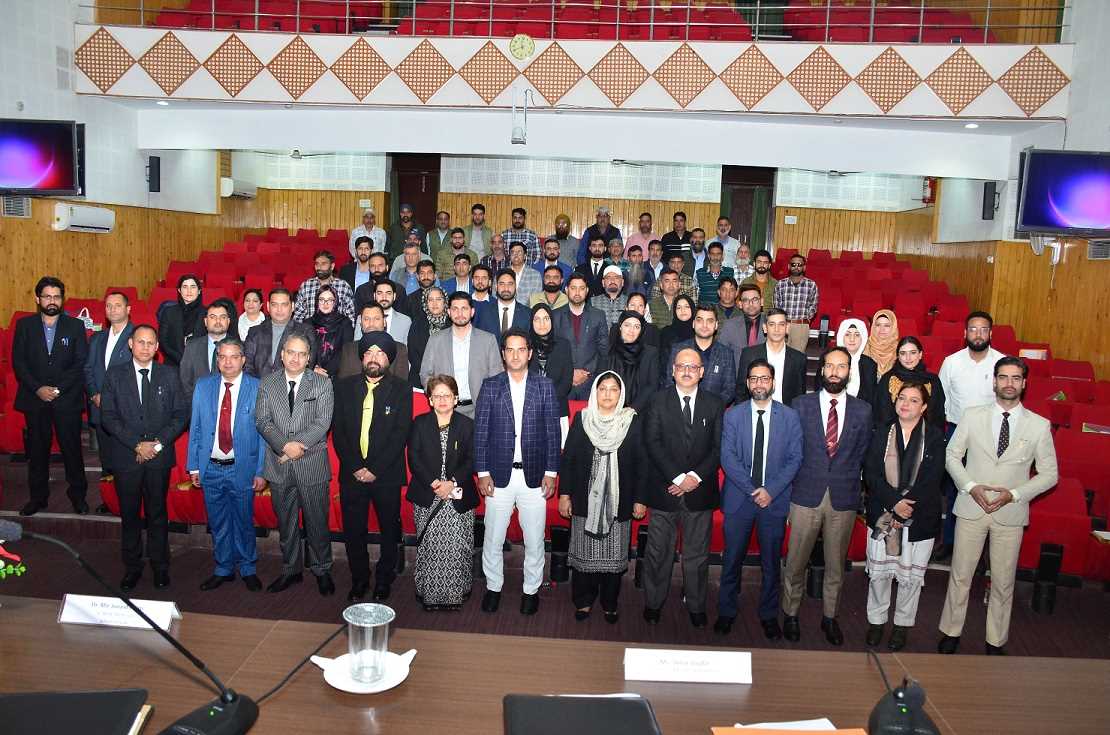
The Jammu & Kashmir Judicial Academy, Srinagar, organized a one-day special orientation programme on “Medical Forensics & Medico-Legal Aspects in Trial; Different Dimensions of Cyber Crimes and Electronic Evidence.” The event was held under the patronage of Chief Justice of J&K and Ladakh, Justice Arun Palli, and guided by the Chairperson and members of the Academy’s Governing Committee.
The programme was attended by judicial officers of the District Judiciary of Kashmir Province and UT of Ladakh, along with public prosecutors, assistant public prosecutors, and investigating officers.
Director of the Academy, Sonia Gupta, in her opening remarks, highlighted the need for the judiciary and prosecution to stay updated on evolving forensic and technological developments critical to criminal justice.
Senior Assistant Professor Dr. Mir Junaid Alam of the University of Kashmir spoke on the Information Technology Act, 2000, focusing on cybercrime, data breaches, and the challenges of digital evidence. He emphasized the need for judicial officers and investigators to understand digital footprints, data preservation, and electronic evidence admissibility.
Dr. Aneeda Jan, Senior Assistant Professor, discussed the constitutional and ethical aspects of medical forensics, stressing the role of technology—including digital imaging, DNA analysis, and AI tools—in transforming medico-legal practices.
Registrar Vigilance, Rajeev Gupta, addressed the characteristics and admissibility of electronic evidence, highlighting challenges in verifying metadata, digital signatures, and ensuring procedural integrity.
The programme concluded with an interactive session where participants discussed practical challenges in handling medico-legal and cybercrime cases. The Academy reaffirmed its commitment to enhancing judicial knowledge and ensuring justice delivery keeps pace with advancements in forensic science and technology.
The Jammu & Kashmir Judicial Academy, Srinagar, organized a one-day special orientation programme on “Medical Forensics & Medico-Legal Aspects in Trial; Different Dimensions of Cyber Crimes and Electronic Evidence.” The event was held under the patronage of Chief Justice of J&K and Ladakh, Justice Arun Palli, and guided by the Chairperson and members of the Academy’s Governing Committee.
The programme was attended by judicial officers of the District Judiciary of Kashmir Province and UT of Ladakh, along with public prosecutors, assistant public prosecutors, and investigating officers.
Director of the Academy, Sonia Gupta, in her opening remarks, highlighted the need for the judiciary and prosecution to stay updated on evolving forensic and technological developments critical to criminal justice.
Senior Assistant Professor Dr. Mir Junaid Alam of the University of Kashmir spoke on the Information Technology Act, 2000, focusing on cybercrime, data breaches, and the challenges of digital evidence. He emphasized the need for judicial officers and investigators to understand digital footprints, data preservation, and electronic evidence admissibility.
Dr. Aneeda Jan, Senior Assistant Professor, discussed the constitutional and ethical aspects of medical forensics, stressing the role of technology—including digital imaging, DNA analysis, and AI tools—in transforming medico-legal practices.
Registrar Vigilance, Rajeev Gupta, addressed the characteristics and admissibility of electronic evidence, highlighting challenges in verifying metadata, digital signatures, and ensuring procedural integrity.
The programme concluded with an interactive session where participants discussed practical challenges in handling medico-legal and cybercrime cases. The Academy reaffirmed its commitment to enhancing judicial knowledge and ensuring justice delivery keeps pace with advancements in forensic science and technology.
© Copyright 2023 brighterkashmir.com All Rights Reserved. Quantum Technologies